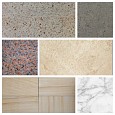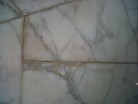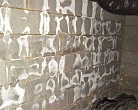Hover over a question with the cursor to reveal the answer. If you are experiencing an application issue that is not addressed here or need answers to a question you do not see listed here, please contact NCL Technical Support at technicalsupport@nclonline.com
Q: How do I know what stone surface I have?
A: It is important to identify your stone surface fully before any damage is done. To make it as simple as possible there are two basic types of stone. Those that react and can be damaged by acid based products; ie; marble, limestone, travertine, sandstone, soapstone, concrete and terrazzo. The second type are stone surfaces that are not affected by acid based cleaners: ie; granite, quartz, quartzite, brick, slate, bluestone or flagstone.
Many types of stone surfaces are sensitive to the ph of cleaners (low acid content vs. high acid content) and therefore can cause damage to the surface. In today’s world with the internet the easiest way to identify various stone surfaces is to compare pictures with what you are trying to identify. And develop a cleaning plan from there.
The NCL Routine Stone Maintenance Products can be used on all types of stone. They include PATINA Stone Cleaner and Conditioner, STONE KLEEN Daily Neutral Stone Cleaner and Hurricane Intensive Stone Cleaner.
Q: How do I clean ceramic and porcelain tile and grout surfaces?
A: Ceramic tile is very non-porous, meaning it absorbs very little. The soils will be topical and can be removed easily with the right cleaner. NCL CYCLONE intensive tile and grout cleaner is the go to product for intensive cleaning of ceramic tile. Agitation with a scrubbing pad can easily remove soils from the tile. The challenge is the grout lines. To fully clean the grout lines you need a brush. Use a good medium stiff plastic brush to reach down and scrub into the grout lines. Dilute product according to label.
Q: How do I give marble a shine?
A: The NCL Marble Care polishing products are the backbone of the NCL Line of Stone Care products. If the shine on the floor surface is not too far gone then polishing using NCL ONE STEP Crystallizer Spray n’ Buff with an NCL AQUA MAGIC pad on your floor machine will develop a nice shine. If the shine looks cloudy or unclear then the use of NCL MRP Marble Restoration Paste spread over an NCL AQUA MAGIC pad and run across the floor with your floor machine will remove deeper scratches and develop a better, higher shine.
If it is a Terrazzo floor surface you can do the same procedure using NCL ROCK HARD Stone Hardener instead of ONE STEP.
Q: How to get rid of rust stains on stone surfaces?
A: Handle marble surfaces carefully. Use commercially made “Rust Remover”. These products are acid based so they will etch marble and will usually require polishing to blend the gloss on the surface.
Note: Sometimes rust is part of the stone and is all the way through. You need to determine if the rust is topical before trying to remove.
Q: How do you take care of counter tops at home or at work?
A: Depending on the purpose of the counter top and where it is will determine the different ways you can maintain it. NCL STONE BEAUTY countertop polish is a great way to protect and liven up the character in a stone counter top in a hotel, as an example.
But where food may be prepared or served there are better ways to protect, clean and sanitize the surface. If you have a granite, quartz, marble or even a concrete counter top in your home then cleaning with NCL HURRICANE regularly, applying NCL SURFACE BARRIER impregnator to protect from stains and sanitizing by using NCL SPRITZ ready to use no rinse surface sanitizer is the best way to keep your counter tops clean, safe and germ free.
Q: How do I remove the white crystal like residue on my exterior or basement stone walls?
A: This deposit is called Efflorescence aka Effervescence. It is a crystalline deposit of salts that can form when water is present in or on brick, concrete, stone, stucco or other building surfaces. It has a white or grayish tint and consists of salt deposits left behind when water evaporates. Luckily, since most exterior building surfaces are not damaged by acid cleaners and usually basement walls are made of cinderblock the easiest and fastest way to remove that white powdery residue is to scrub using NCL TWISTER acid based mineral deposit & grout film remover. Dilute product according to label.
 English
English Español
Español


